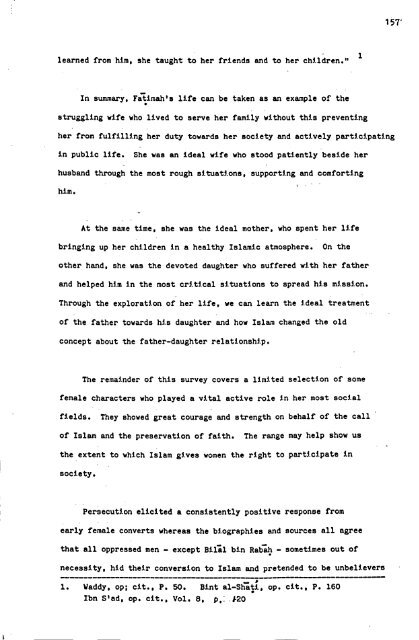Download - University of Salford Institutional Repository
Download - University of Salford Institutional Repository
Download - University of Salford Institutional Repository
You also want an ePaper? Increase the reach of your titles
YUMPU automatically turns print PDFs into web optimized ePapers that Google loves.
learned from him, she taught to her friends and to her children. "<br />
In summary, F; t*imah's life can be taken as an example <strong>of</strong> the<br />
0<br />
struggling wife who lived to serve her family without this preventing<br />
her from fulfilling her duty towards her society and actively participating<br />
in public life. She was an ideal wife who stood patiently beside her<br />
husband through the most rough situations, supporting and comforting<br />
him.<br />
At the same time, she was the ideal mother, who spent her life<br />
bringing up her children in a healthy Islamic atmosphere. On the<br />
other hand, she was the devoted daughter who suffered with<br />
her father<br />
and helped him in the most critical situations to spread his mission.<br />
Through the exploration <strong>of</strong> her life, we can learn the ideal treatment<br />
<strong>of</strong> the father towards his daughter and how Islam changed the old<br />
concept about the father-daughter relationship.<br />
The remainder <strong>of</strong> this survey covers a limited selection <strong>of</strong> some<br />
female characters who played a vital active role in her most social<br />
fields. They showed great courage and strength on behalf <strong>of</strong> the call<br />
<strong>of</strong> Islam and the preservation <strong>of</strong> faith. The range may help show us<br />
the extent to which Islam gives women the right to participate in<br />
society.<br />
Persecution elicited a consistently positive response from<br />
early female converts whereas the biographies and sources all agree<br />
that all oppressed men - except Bil7al bin Raah - sometimes out <strong>of</strong><br />
a<br />
necessity, hid their conversion to Islam and pretended to be unbelievers<br />
ýA<br />
1. Waddy, op; cit.. P. 50* Bint al-Shatit op. cit-9 P. 160<br />
Ibn Slad, op. cit., Vol. 8, p. * 420<br />
157'
















